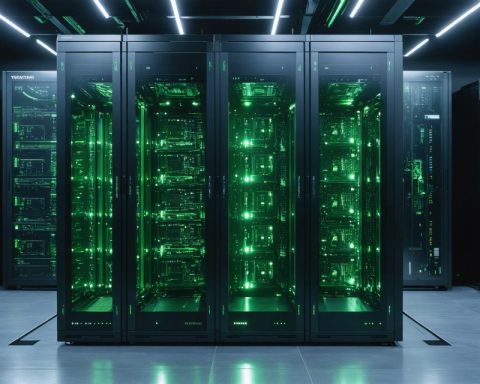The Future of AI is Here
President Donald Trump’s ambitious Stargate initiative, a colossal $500-billion project, is set to revolutionize artificial intelligence infrastructure in the United States. Powered by tech giants like Oracle, OpenAI, and SoftBank, this venture aims to enhance AI capabilities over the next four years. Analysts believe this initiative will invigorate the broader tech sector, stimulating advancements in inference, training, and semiconductor technologies.
Among the key beneficiaries identified by Mizuho Securities is Broadcom, which is projected to expand its serviceable addressable market significantly from $20 billion to an estimated $60-$90 billion by 2024, largely due to its new Trainium platform. Broadcom’s ownership of various intellectual property rights further solidifies its advantageous position as it develops custom silicon chips.
In addition to Broadcom, Nvidia, Credo Technology, Arm Holdings, and Micron Technology are expected to enjoy substantial gains. Credo and Micron will thrive, thanks to the increased demand for connectivity and storage solutions. Arm is poised to earn between $150 million and $200 million annually from royalties tied to its chip designs.
Despite the rise of these competitors, analysts still foresee Nvidia maintaining its dominance in the AI chip market. As the Stargate project unfolds, the semiconductor industry is set for a transformative journey, driving innovation and growth for years to come.
The Broader Impact of AI Infrastructure Development
As the private and public sectors converge on AI infrastructure projects like the Stargate initiative, the implications extend well beyond technological advancement. This monumental investment can reshape society and culture, influencing how we interact with machines and one another. The potential shift toward AI-driven decision-making in everyday life could lead to greater efficiencies, but it also raises concerns about privacy, ethics, and the digital divide. Access to advanced AI tools may become a crucial factor in determining socioeconomic status, further entrenching existing disparities.
Moreover, the global economy stands to be transformed. As companies such as Nvidia and Broadcom expand their markets through AI, competition will intensify across international borders. Countries adept at harnessing AI technology could assert greater influence on the world stage, creating a surge in global technology partnerships. Notably, these changes could shift supply chains, as regions that develop leading-edge semiconductor capabilities may attract more investment.
Environmentally, the AI sector is not without its challenges. The demand for data center energy and semiconductor production can lead to significant carbon footprints. As AI accelerates, sustainable practices must be prioritized to mitigate potential damages to natural ecosystems. Future trends will likely focus on developing AI systems that not only achieve performance goals but do so with minimal environmental impact, aligning technological progress with ecological responsibility. As we stand on the brink of this AI revolution, the long-term significance of these initiatives will echo through generations, reshaping industries, economies, and our very way of life.
The Future of AI: Transformative Investments Shaping Tomorrow’s Technology
The Impact of the Stargate Initiative on AI and Semiconductor Industries
The ambitious Stargate initiative, spearheaded by President Donald Trump, is not just a massive financial investment but also a pivotal step towards reshaping the artificial intelligence landscape in the United States. With a funding cap of $500 billion, it aims to bolster the country’s AI infrastructure and influence the tech sector significantly over a span of four years. This monumental project is expected to have a ripple effect on companies involved in AI development, particularly those focused on inference, training, and semiconductor technologies.
Key Players Benefiting from the Initiative
Broadcom has emerged as one of the central beneficiaries of this transformational initiative. Industry analysts from Mizuho Securities project that Broadcom’s serviceable addressable market could skyrocket from $20 billion to anywhere between $60-$90 billion by 2024. This magnificent leap is largely attributed to the launch of its Trainium platform, which promises to enhance processing capabilities for AI applications.
Moreover, Broadcom’s extensive portfolio of intellectual property rights bolsters its competitive edge, enabling the development of custom silicon chips tailored for specific tasks. This positions Broadcom as a leader in the market and underscores its crucial role in the evolving AI ecosystem.
Other technology powerhouses, including Nvidia, Credo Technology, Arm Holdings, and Micron Technology, are also poised to reap substantial benefits following the initiative’s implementation. With the surge in demand for storage solutions and connectivity, both Credo and Micron are expected to see robust growth. In parallel, Arm Holdings anticipates earnings of $150 million to $200 million annually from royalties linked to its innovative chip designs.
Despite the emergence of competitors like Broadcom, analysts remain confident in Nvidia’s continued leadership in the AI chip market. This is largely due to Nvidia’s comprehensive expertise in GPU design, historically favored by AI developers for its superior performance capabilities.
Pros and Cons of the Stargate Initiative
Pros:
– Investment in Infrastructure: The Stargate initiative can substantially enhance AI and data processing technologies within the United States.
– Economic Growth: Amplified financial backing in technology sectors is likely to stimulate job creation and attract further investments.
– Innovation Catalyst: The initiative may accelerate breakthroughs in AI and semiconductor technologies, leading to enhanced products and services.
Cons:
– Resource Allocation Concerns: Critics might argue over the significant financial resources required for such a vast project, questioning whether it may detract from other pressing needs.
– Market Disruption: The rapid advancement in AI could potentially displace existing technologies and job markets, raising concerns over socio-economic impacts.
Trends and Insights for the Future of AI
The Stargate initiative is not just a localized effort but part of a global trend toward leveraging artificial intelligence for economic and technological advancements. As countries worldwide invest heavily in AI capabilities, the competition is set to heighten, leading to rapid innovations and possibly unprecedented technological ecosystems.
Innovations and Their Market Impact
The integration of advanced semiconductor technologies with AI is set to create an interdependent relationship between the two fields, enhancing performance across various applications, from autonomous vehicles to smart city solutions. This marriage of AI and semiconductors will define the tech landscape over the next decade.
Conclusion
The Stargate initiative undeniably marks a significant chapter in the advancement of artificial intelligence and its supporting infrastructure. With key players like Broadcom, Nvidia, and others reaping the benefits, the semiconductor industry appears poised for transformative growth. As the project unfolds, it will be fascinating to observe how these developments shape the future of technology in the United States and beyond.
For more insights, visit TechCrunch.















